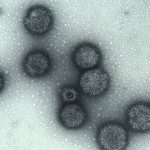Lien vers Pubmed [PMID] – 26085147
J. Virol. 2015 Sep;89(17):8880-96
UNLABELLED: Zika virus (ZIKV) is an emerging arbovirus of the Flaviviridae family, which includes dengue, West Nile, yellow fever, and Japanese encephalitis viruses, that causes a mosquito-borne disease transmitted by the Aedes genus, with recent outbreaks in the South Pacific. Here we examine the importance of human skin in the entry of ZIKV and its contribution to the induction of antiviral immune responses. We show that human dermal fibroblasts, epidermal keratinocytes, and immature dendritic cells are permissive to the most recent ZIKV isolate, responsible for the epidemic in French Polynesia. Several entry and/or adhesion factors, including DC-SIGN, AXL, Tyro3, and, to a lesser extent, TIM-1, permitted ZIKV entry, with a major role for the TAM receptor AXL. The ZIKV permissiveness of human skin fibroblasts was confirmed by the use of a neutralizing antibody and specific RNA silencing. ZIKV induced the transcription of Toll-like receptor 3 (TLR3), RIG-I, and MDA5, as well as several interferon-stimulated genes, including OAS2, ISG15, and MX1, characterized by strongly enhanced beta interferon gene expression. ZIKV was found to be sensitive to the antiviral effects of both type I and type II interferons. Finally, infection of skin fibroblasts resulted in the formation of autophagosomes, whose presence was associated with enhanced viral replication, as shown by the use of Torin 1, a chemical inducer of autophagy, and the specific autophagy inhibitor 3-methyladenine. The results presented herein permit us to gain further insight into the biology of ZIKV and to devise strategies aiming to interfere with the pathology caused by this emerging flavivirus.
IMPORTANCE: Zika virus (ZIKV) is an arbovirus belonging to the Flaviviridae family. Vector-mediated transmission of ZIKV is initiated when a blood-feeding female Aedes mosquito injects the virus into the skin of its mammalian host, followed by infection of permissive cells via specific receptors. Indeed, skin immune cells, including dermal fibroblasts, epidermal keratinocytes, and immature dendritic cells, were all found to be permissive to ZIKV infection. The results also show a major role for the phosphatidylserine receptor AXL as a ZIKV entry receptor and for cellular autophagy in enhancing ZIKV replication in permissive cells. ZIKV replication leads to activation of an antiviral innate immune response and the production of type I interferons in infected cells. Taken together, these results provide the first general insights into the interaction between ZIKV and its mammalian host.


